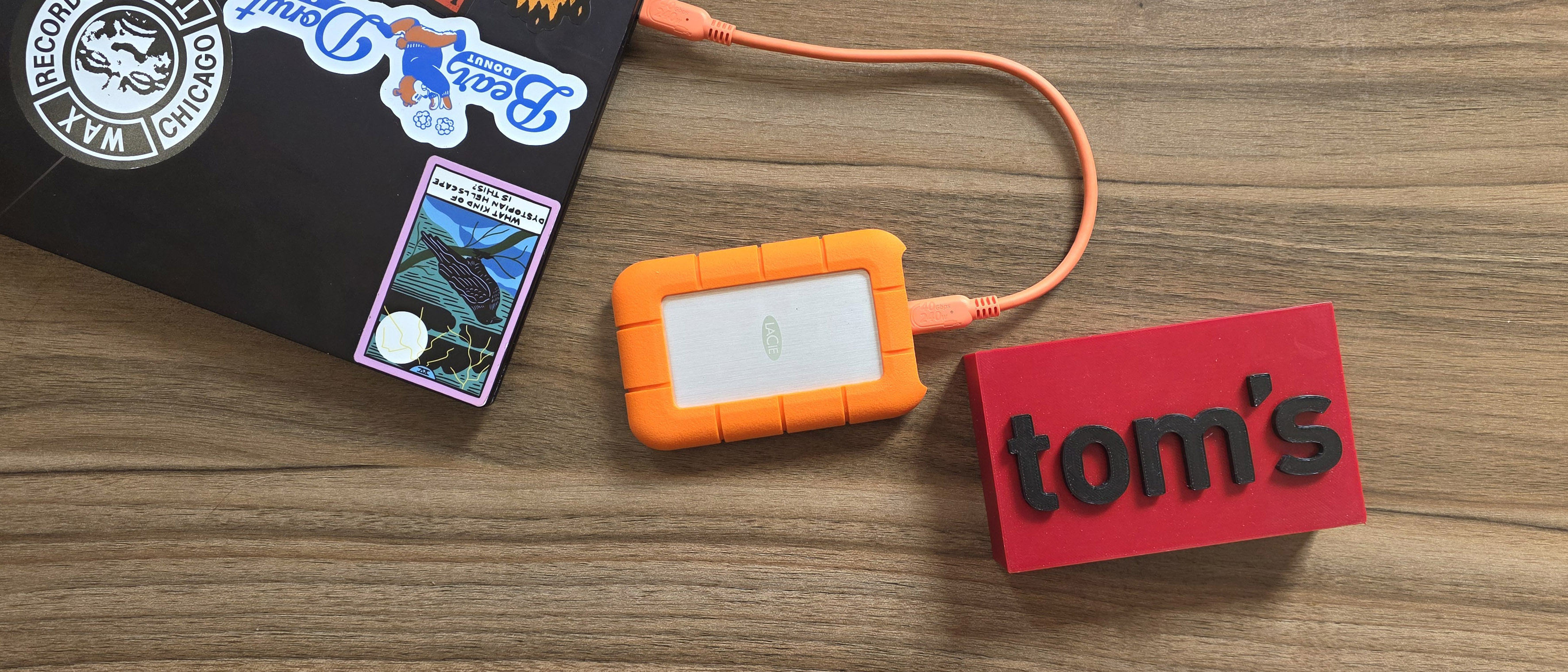Tom's Hardware Verdict
LaCie’s Rugged SSD4 is a fast, premium-feeling 40 Gbps drive, whether you’re on a Mac or a PC. Like other Rugged models, it commands a price premium, but if you need speedy versatility across operating systems, it’s the new drive to beat.
Pros
- +
Fastest external storage drive we’ve tested (in Windows)
- +
Very fast on Macs
- +
Warranty includes three years of data recovery
Cons
- -
Expensive
Why you can trust Tom's Hardware
It’s not quite fair to say if you’ve seen one LaCie external drive, you’ve seen them all. But the orange silicon bumper and silver internal aluminum shell of LaCie’s Rugged SSD4 looks to be the same chassis used in last year’s Rugged Mini SSD, and similar to the company’s earliest Rugged drives, dating back 20 years. But this latest Rugged drive sports a fast 40 Gbps interface, making it a competitor to one of the best external SSDs, Corsair’s USB4-based EX400U.
Perhaps because of the brand’s historical tendency toward Mac users, LaCie isn’t expressly calling this a USB4 drive, instead stating the drive has a “USB 40 Gbps port.” But I tested it on our Asus ROG Crosshair X870E Hero-based storage testbed over USB4 and spot-checked performance on an M4 MacBook Air with Thunderbolt 4; the Rugged SSD4 was similarly speedy on both machines. And that’s how LaCie seems to be marketing the drive, as one that supports all recent versions of Thunderbolt and USB, giving you fast performance on whatever system you plug the drive into. For the most part, it seems like LaCie has delivered on that front, making this drive more universally appealing than its Thunderbolt 5-based Rugged SSD Pro5 that launched earlier this year.
We’ll have to put the drive through our usual slate of benchmark testing to see if it earns its fairly high asking price – the 4 TB model we tested is expected to sell for $479. But first, here are the specs for the drive, direct from LaCie:
LaCie Rugged SSD4 specifications
Product | 1 TB | 2 TB | 4 TB |
Interface / Protocol | USB4 (40 Gbps) | USB4 (40 Gbps) | USB4 (40 Gbps) |
Included | USB-C cable | USB-C cable | USB-C cable |
Sequential Read | Up to 4,000 MB/s | Up to 4,000 MB/s | Up to 4,000 MB/s |
Sequential Write | Up to 3,800 MB/s | Up to 3,800 MB/s | Up to 3,800 MB/s |
Dimensions | 105 x 67 x 18 mm | 105 x 67 x 18 mm | 105 x 67 x 18 mm |
Weight | 109 grams | 109 grams | 109 grams |
Warranty | 3 years | 3 years | 3 years |
LaCie Rugged SSD4 Design and accessories
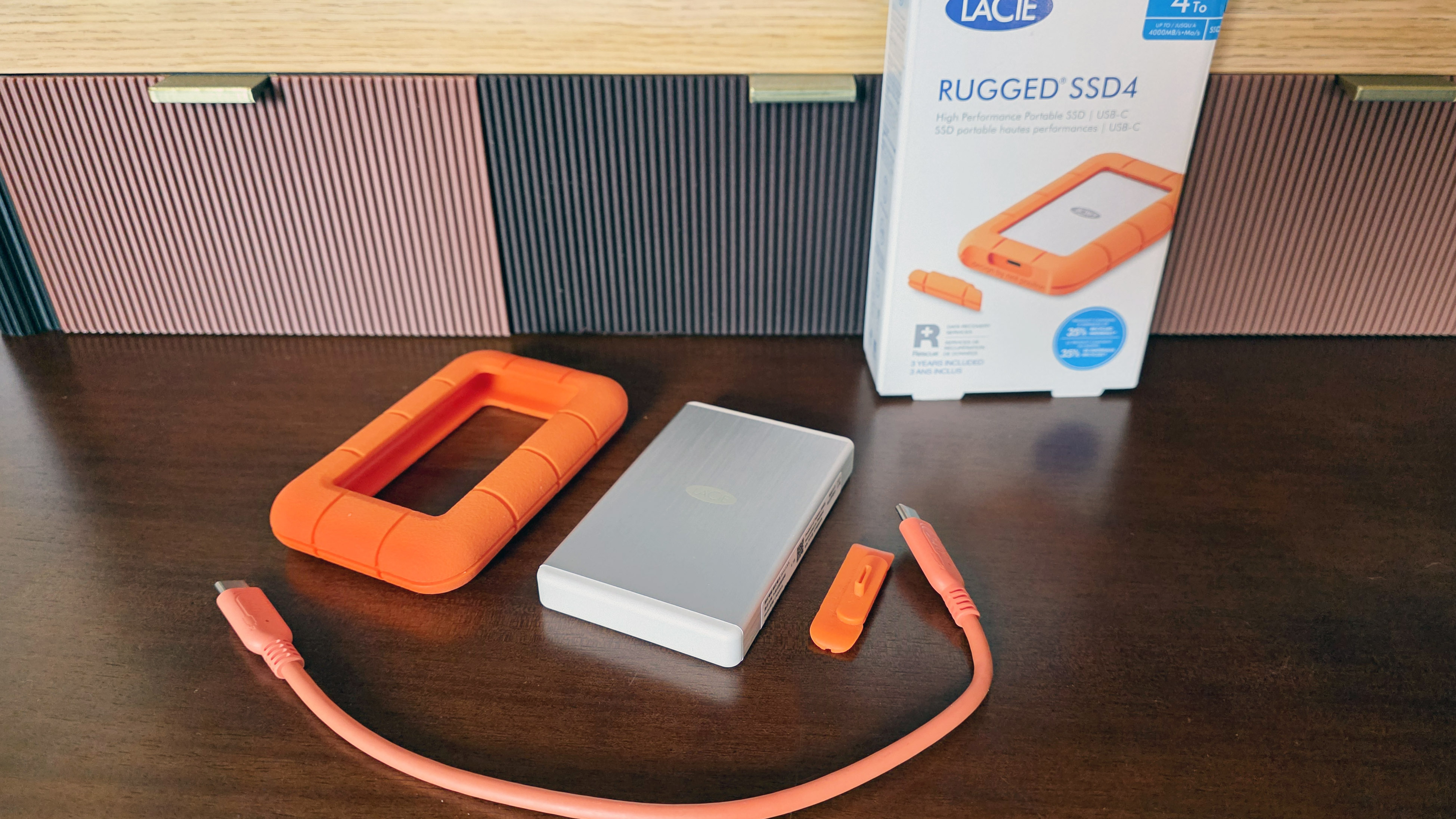
The LaCie Rugged branding comes with the requisite IP54 rating for protection against dust and water splashes (so long as you have the silicon plug over the port). And LaCie says the drive is also built to withstand drops up to 3 meters as well as up to 2,000 pounds of pressure. The drive certainly feels rigid, with or without its orange silicon protection.
In the box, you get the drive and the removable orange silicon bumper, along with a USB-C-to-USB-C cable that’s just shy of a foot long. The cable is also orange, which is helpful if you’re swimming in a sea of cables, most of which don’t have the bandwidth for a drive this fast. The cable also has “40 Gbps 240W” embossed on each end, indicating its speed and charge rating. Given its length, though, it’s unlikely you’re going to want to charge a laptop or anything more power-hungry with this short cable.
Software
As with previous LaCie (and parent company, Seagate) devices, the three-year warranty also comes with the company’s Rescue Data Recovery service, should the drive physically fail during the warranty period. Two months of Adobe’s Creative Cloud Pro is also included, though LaCie stipulates this isn’t valid in all countries, so check before buying if the software trial appeals to you.
Comparison products
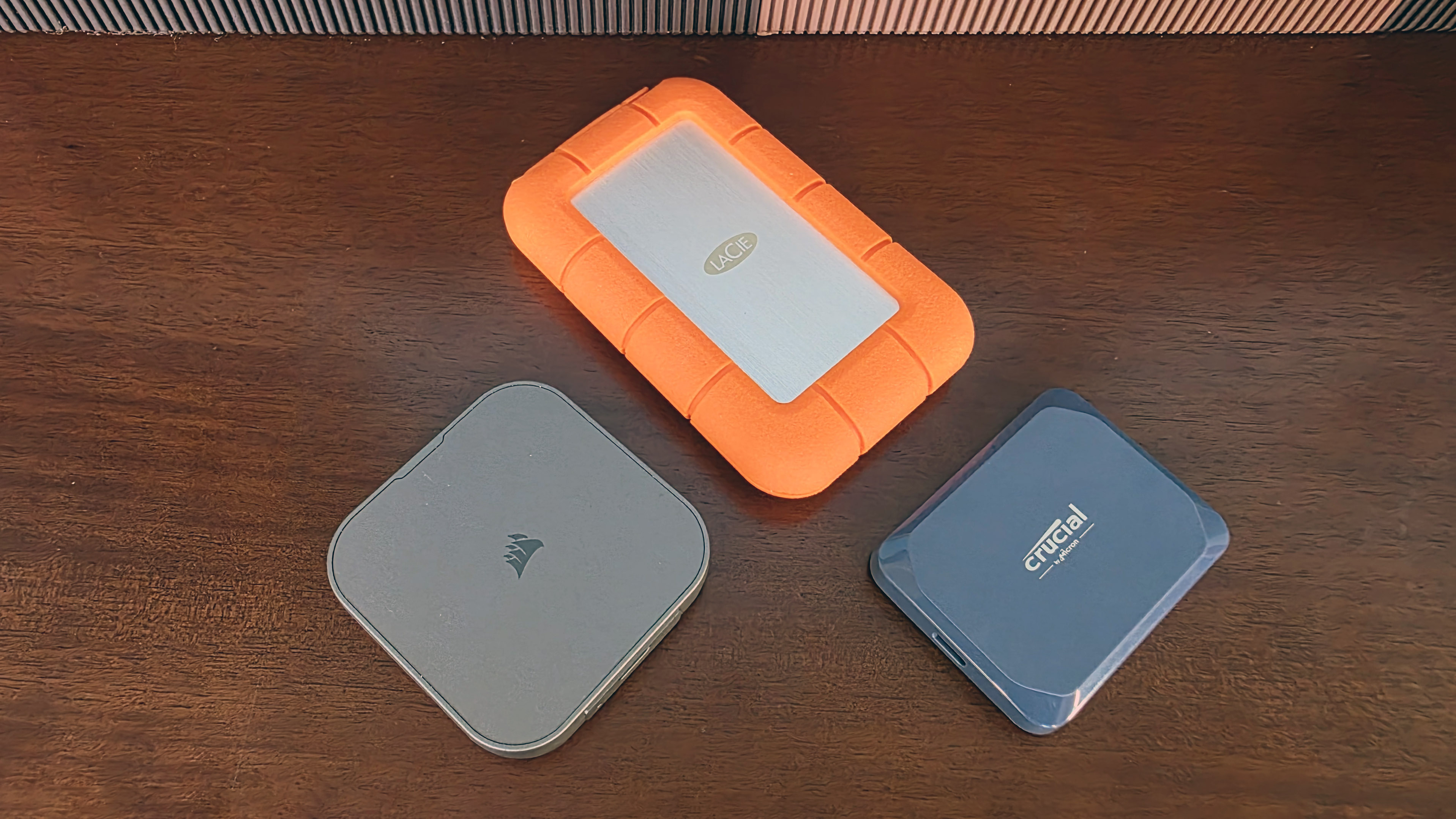
LaCie has never been a particularly value-focused brand. And the Rugged SSD4’s launch prices ($134 for the 1 TB version, $249 for the 2 TB model, and $479 for the top 4 TB capacity that we tested) certainly aren’t going to compete with budget or mainstream external drives. But the SSD4 is cheaper than the company’s Pro5 Thunderbolt 5 drive (currently selling for $524 for 4 TB). Corsair’s USB4 EX400U is significantly cheaper, though, at $109 for 1 TB, $179 for 2 TB, and $309 for 4 TB.
Get Tom's Hardware's best news and in-depth reviews, straight to your inbox.
Whether or not the LaCie drive is worth the extra $25-$170 (depending on capacity) over the Corsair drive will depend on your performance needs. But as we’ll soon see in testing, the LaCie drive is significantly faster than the Corsair in many of our benchmarks.
The LaCie Rugged SSD4 is also smaller than the company’s hard drive days, at 105 x 67 x 18 mm and 109 grams. But that is still larger and heavier than most of its external storage competition. It’s about twice the size of Corsair’s EX400U, and Crucial’s 20 Gbps X10 drive is less than a quarter the size of the LaCie. The Corsair drive has an embedded metal ring for easily snapping on the back of an iPhone and a few Android phones, if that’s important to you.
Still, the LaCie drive is small enough to fit in most pants or backpack pockets, so it’s only bulky in comparison to smaller modern alternatives. I do wish the company could find a better solution than the untethered silicon USB-C plug, though, because I’d probably lose that within weeks of using the drive – if not days.
Storage testbed update
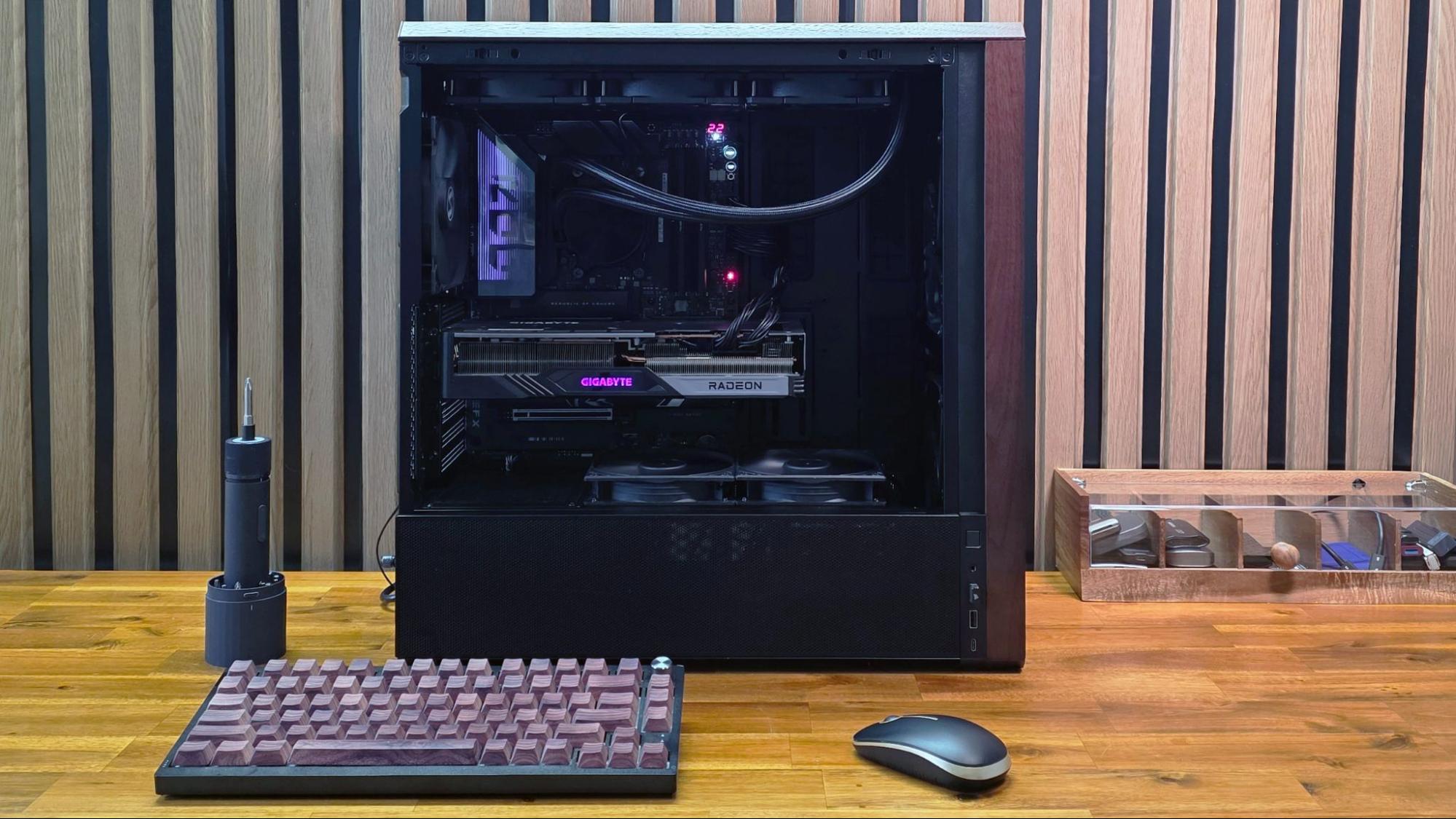
In early 2025, we updated our external storage testbed to an AMD Ryzen 7600X-based PC with an Asus ROG Crosshair X870E Hero motherboard, installed in Lian Li’s Lancool 217 case. This was done in part because we needed a system with native USB4 support for upcoming drives (like this one).
All the drives in the charts below have been re-tested on the new X870E system, with the exception of the final Iometer sustained sequential test, which is less about top speed and more about how long a drive can write before depleting any fast cache. We also updated to CrystalDiskMark 8, rather than the older (and non-comparable) version 7 we used on the previous testbed.
Trace Testing - PCMark 10 Storage Benchmark
PCMark 10 is a trace-based benchmark that uses a wide-ranging set of real-world traces from popular applications and everyday tasks to measure the performance of storage devices.
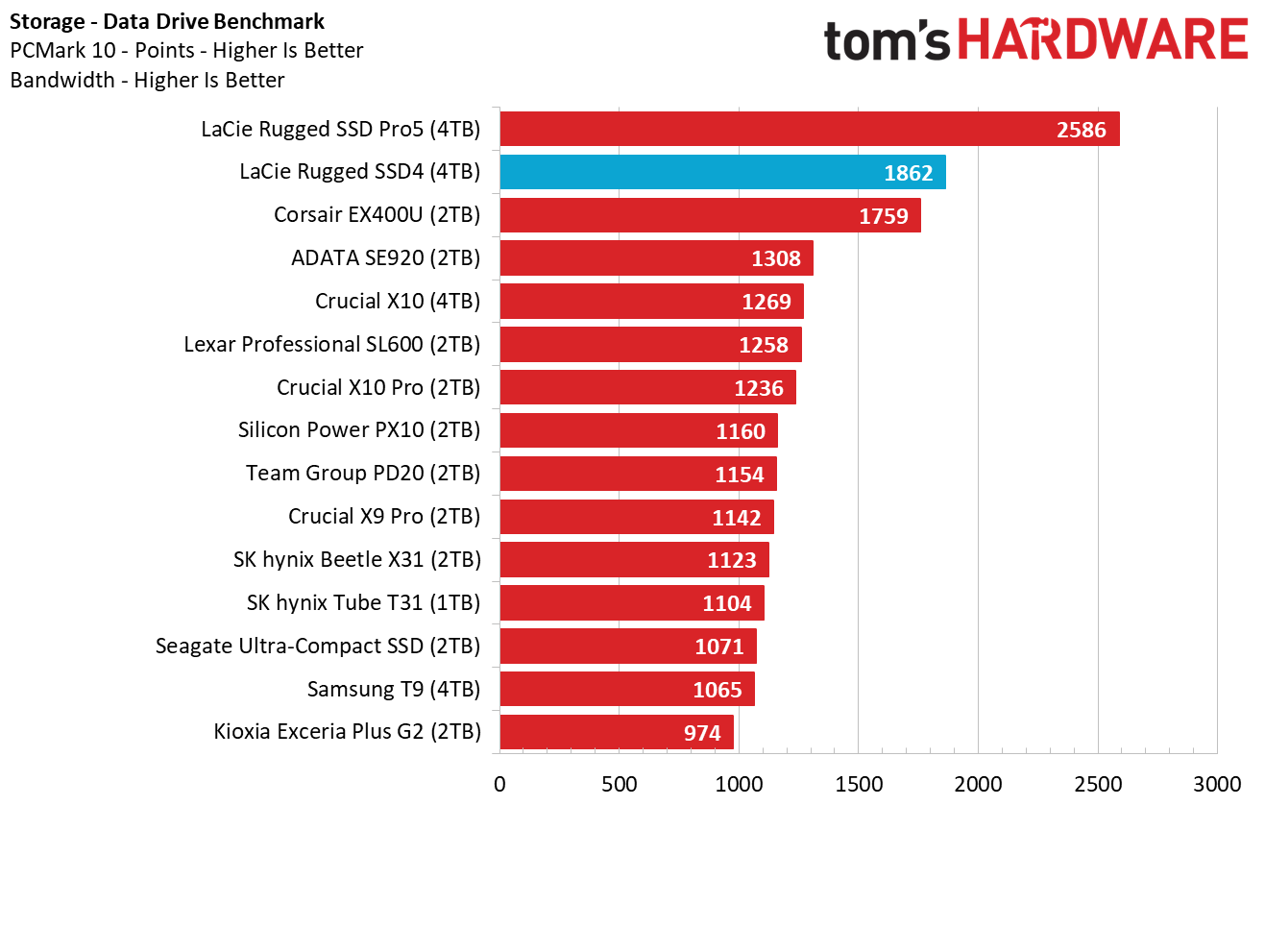
In this first test, the LaCie SSD4 was easily beaten by its slightly older, pricier, Thunderbolt 5-based sibling. But with a score of 1862, the SSD4 beat everything else here, including the USB4-based Corsair EX400U.
Transfer Rates – DiskBench
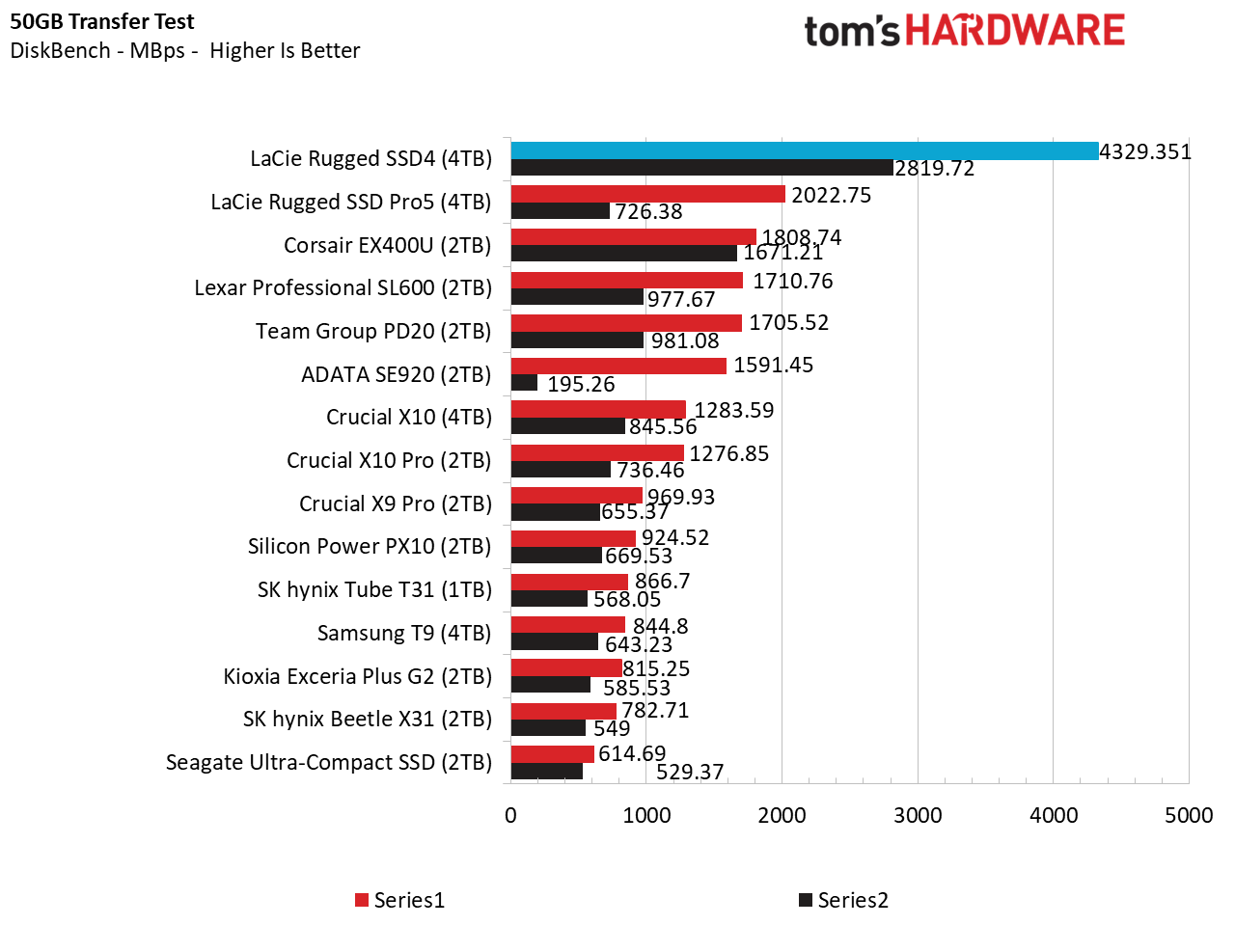
In this real-world file transfer test, the SSD4 drive looked even better, outpacing the LaCie TB5 drive in our Windows 11-based testing, and again beating everything else, including Corsair’s EX400U USB4 drive. In fact, the drive was so fast here (and elsewhere) that I had to adjust the axes of a few of our charts.
Synthetic Testing CrystalDiskMark
CrystalDiskMark (CDM) is a free and easy-to-run storage benchmarking tool that SSD companies commonly use to assign product performance specifications. It gives us insight into how each device handles different file sizes. We run this test at its default settings.
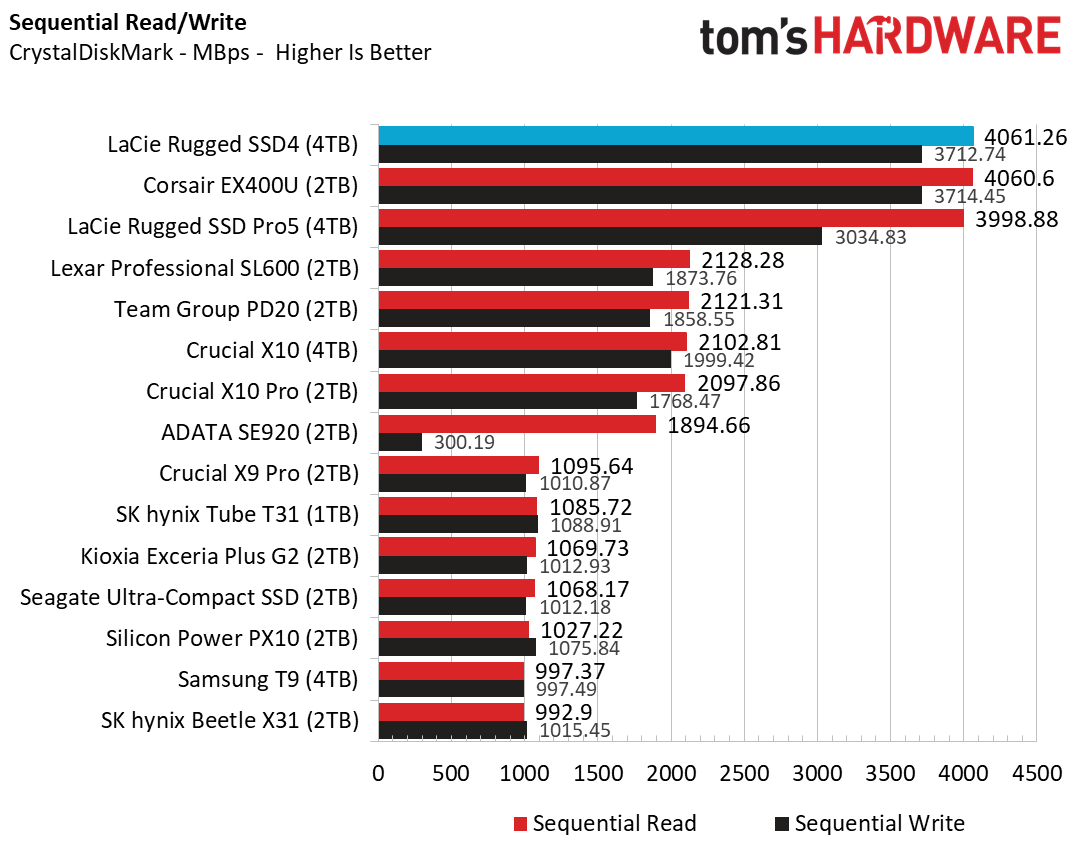
Once again, the LaCie Rugged SSD4 lands on top when it comes to reads, though just barely, and the Corsair USB4 drive managed to edge out a win on writes. But both tests are close enough that this benchmark is essentially a tie between the two USB4 drives.
Because we have seen Mac-focused drives perform much slower on PCs and vice versa, I also spot-checked the performance of the Rugged SSD4 on an M4 Macbook Air via its Thunderbolt 4 port, using AmorphousDiskMark (CrystalDiskMark doesn’t run on Macs), and got slower but still very fast sequential performance of 3,440 MBps reads and 3,093.57 MBps writes.
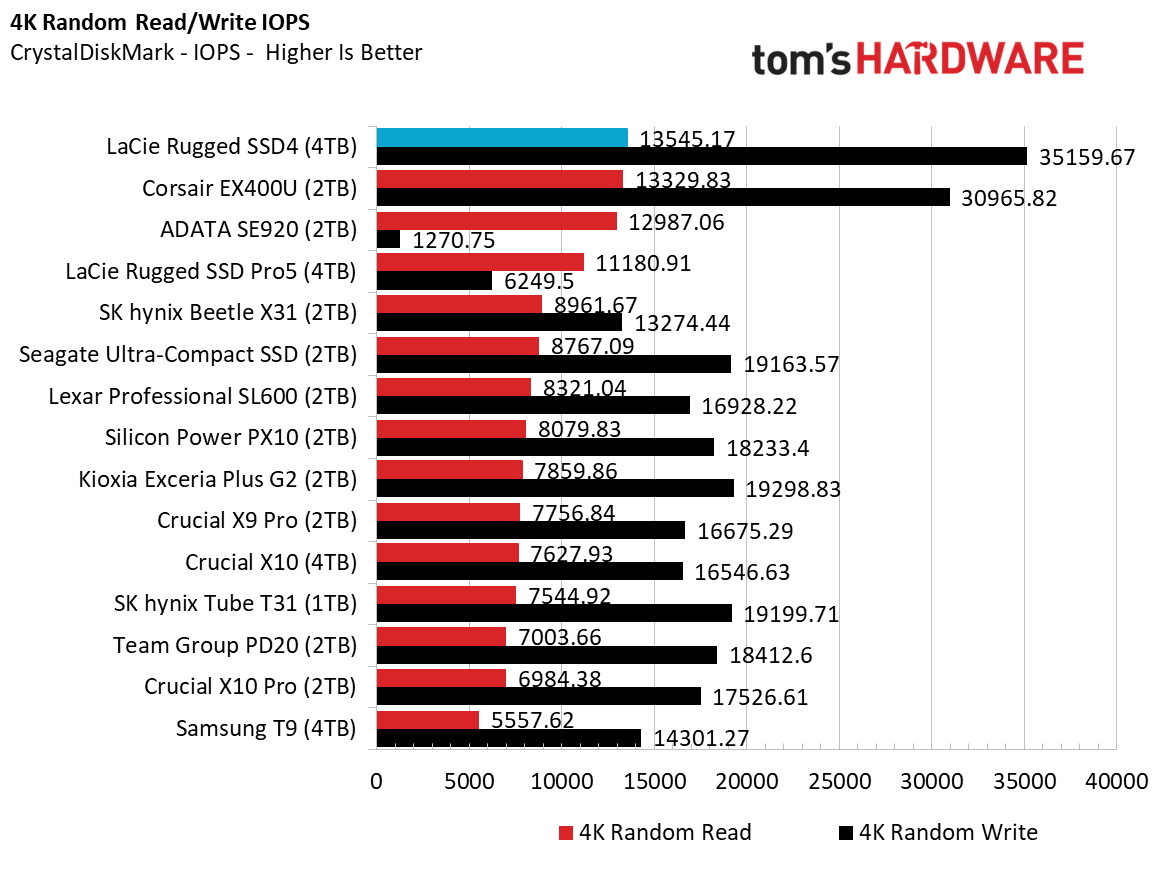
Small file performance racks up another win for LaCie’s Rugged SSD4. It again sticks close to the Corsair drive on reads. But when it comes to writes, it’s in its own league.
Sustained Write Performance
A drive's rated write specifications are only a piece of the performance picture. Most external SSDs (just like their internal counterparts) implement a write cache, or a fast area of flash, programmed to perform like faster SLC, that absorbs incoming data.
Sustained write speeds often suffer tremendously when the workload saturates the cache and slips into the "native" TLC or QLC flash. We use Iometer to hammer the SSD with sequential writes for 15 minutes to measure the size of the write cache and performance after the cache is saturated.
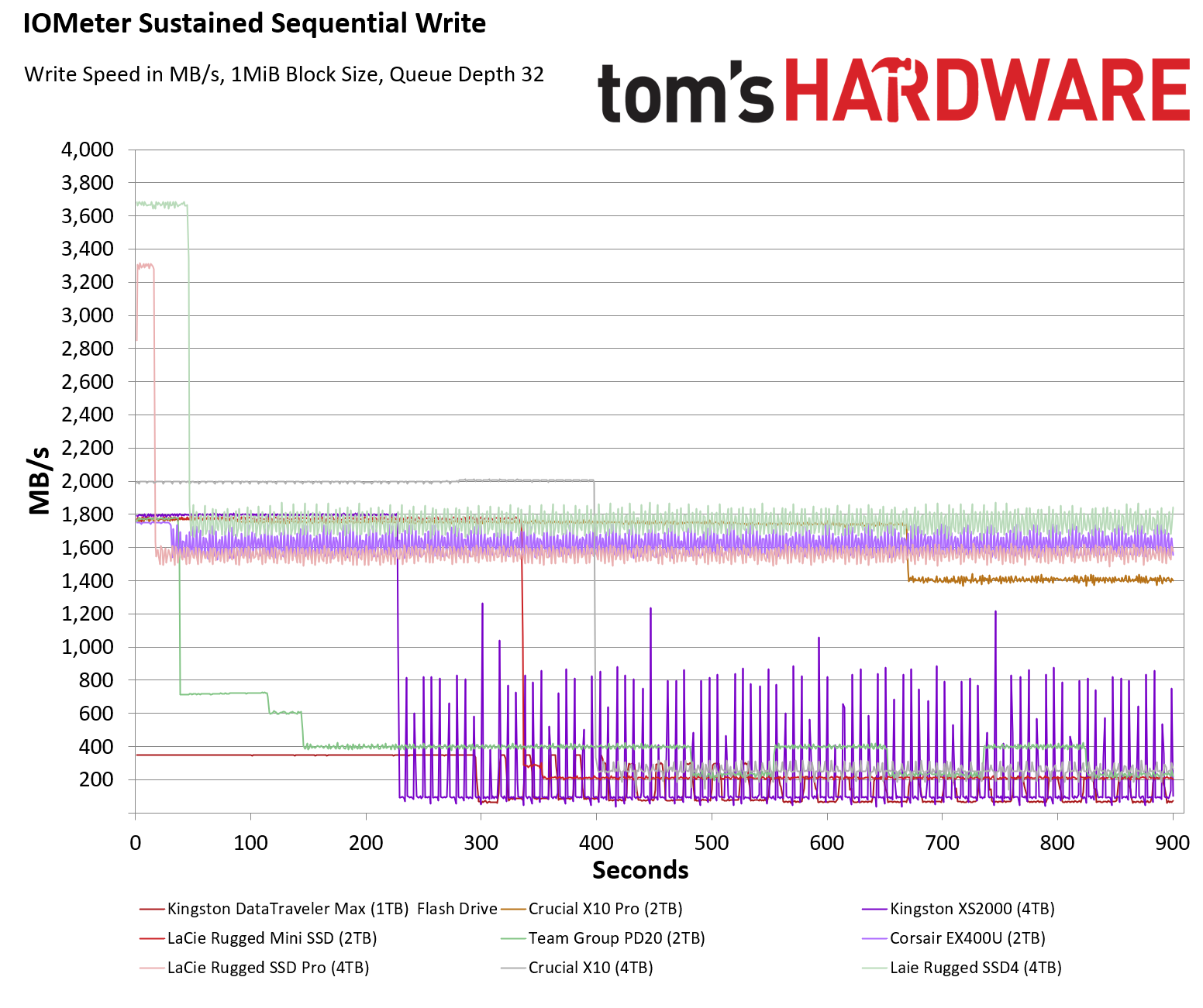
On the one hand, the LaCie Rugged SSD4 lasted just shy of a minute writing at its top speed, above 3,600 MB/s, but that’s enough time to move about 200 gigabytes of data. And after that, while the drive did slow its sustained write speed, it kept writing between 1,600 and 1,800 MB/s for the 15-minute duration of our test data, and actually for a full 30 minutes of our Iometer run without dropping any lower.
And that ‘slower’ write speed the SSD4 delivered is after its cache depletion is actually as fast or faster than most other drives’ peak write speed. So while it would be nice to see LaCie’s drive write longer at its apex, it’s hard to complain much when even the competing USB4 Corsair drive started off writing at just under 1,800 MB/s and quickly dropped into the 1,600-1,700 range.
Bottom line
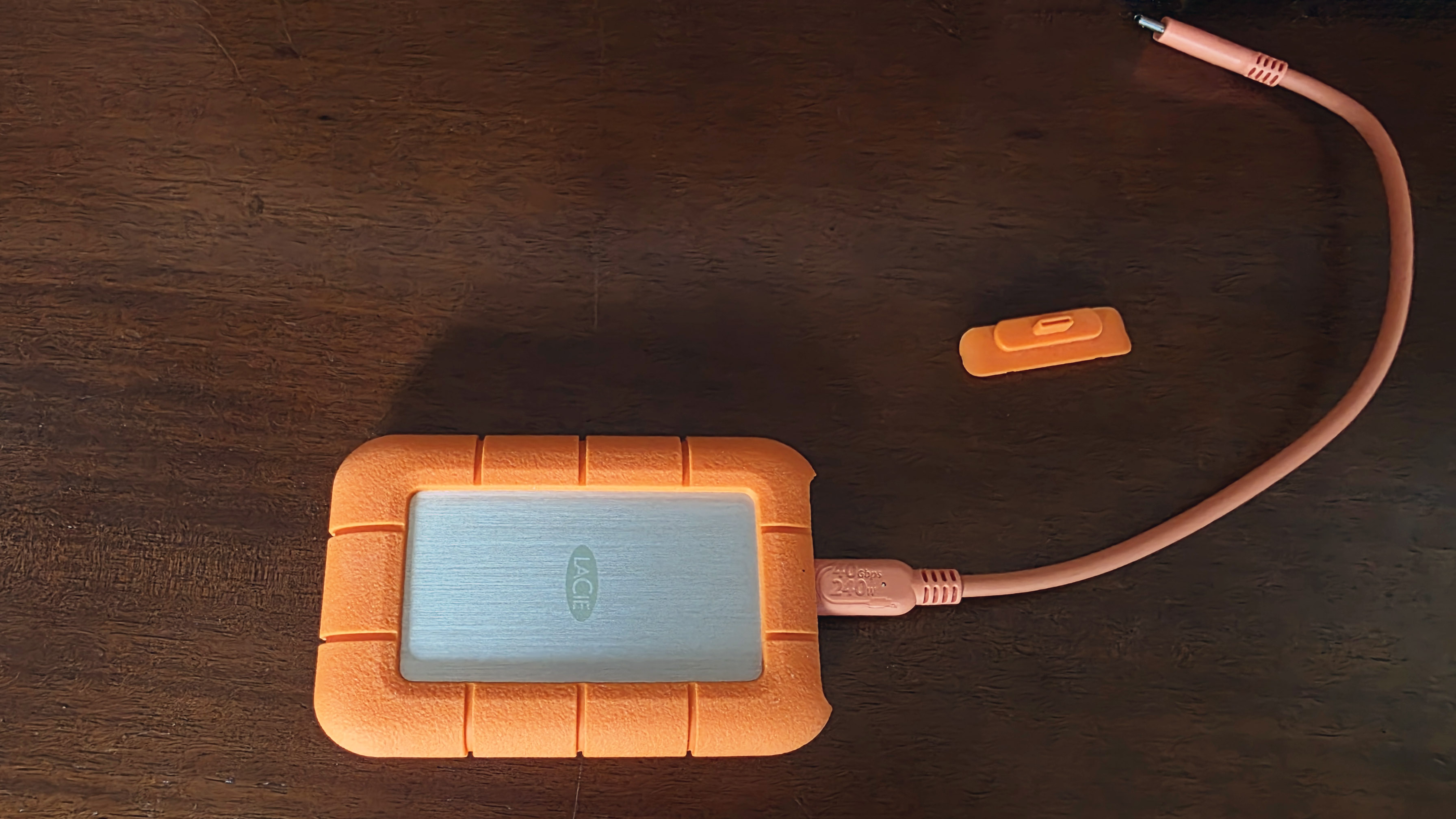
LaCie’s Rugged SSD4 drive sits in an interesting spot. For Windows (and presumably Android) users with USB4, Corsair’s EX400U is nearly as fast in many of our tests, while costing as much as $170 less in the 4 TB model we tested on the LaCie side. And for Mac purists who have the latest hardware, LaCie’s Rugged SSD Pro5 is significantly faster if you have machines with a Thunderbolt 5 port.
That said, for creators and enthusiasts with production workflows or portable file needs that span multiple platforms, the LaCie Rugged SSD4 delivers the fastest performance we’ve seen. Add in the three years of included data recovery,(which you won’t get from Corsair), and the Rugged SSD4 is easy to recommend for those who need speed and peace of mind while working in Windows, macOS, and maybe Android and iOS as well (though we didn’t test the drive on the latter two platforms). While other drives perhaps make more sense for one OS or another, the SSD Pro4 is the best drive we’ve tested for those who want speed without having to think about what platform they’re plugging into.
After a rough start with the Mattel Aquarius as a child, Matt built his first PC in the late 1990s and ventured into mild PC modding in the early 2000s. He’s spent the last 15 years covering emerging technology for Smithsonian, Popular Science, and Consumer Reports, while testing components and PCs for Computer Shopper, PCMag and Digital Trends.
